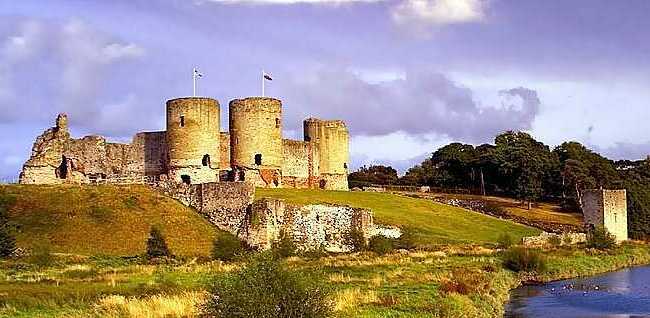
Rhuddlan Castle
John "Aer Hen" Conway married first the sister of the Earl of Devon and second the widow of Richard Border, lord of the manor of Arrow near Alcester in Warwickshire.John Aer Hen's second marriage was to Janet Stanley, a member of the famous Stanleys who became Earls of Derby. His eldest son John Aer Infanc (the young heir) inherited Bodrhyddan, while the second son, Edward, followed the example of his half-brother Hugh and went to England. Here he met and married (no doubt with Sir Hugh's introduction) Ann Burdett, the heiress of the very Richard Burdet whose widow Hugh had married. Unlike Sir Hugh, Edward took little part in public fife, but his descendants became increasingly prominent in the service of the Crown. His son John was created Knight Bannerset in the Scottish campaign of 1547 while his grandson, another John, also knighted in a Scottish campaign, became governor of Ostend from 1586 to 1590. Dying in 1603 he was succeeded in the manor of Arrow, which included Ragley, by his eldest son, Edward, who with his younger brother Fulk served for a considerable time in the campaigns against the Spaniards in the Netherlands. He and Fulk took part in the attack on Cadiz in 1586 where Edward was knighted. The latter then held the governorship of the Brill, a cautionary port in Holland, for some years before returning to England to look after the Arrow estate and to enter civil life, becoming one of the King's principal secretaries of state. When his brother, Sir Fulk, who had been knighted in the field during the Nine-Year war against Hugh O'Neill, died in 1624, Sir Edward succeeded to the vast estate in south-east Antrim granted to Sir Fulk in 1609.
The relationship of Edward Conway, 1st Viscount of Ragley, to Edwin Conway (a1610-1674) of Virginia is not clear. Edwin Conway appears in many genealogist's records as son of Edward Conway, 1st Viscount of Ragley. A single paragraph in the book by Rev Horace Edwin Hayden, "A Genealogy of the Glassell Family", discounts this as only a possibility, NOT fact. A tradition told by Mr. Conway Nutt states that two brothers named Conway, related to the Marquis of Hertford, were exiled to America for political reasons and came to Va. Sir Edward Conway and Captain Thomas Conway were members of the Virginia Company of London, 1609-1620.
|
... The Conways had been settled in Northumberland and Lancaster a hundred years when James Gordon, newly arrived in the colony, asked for the hand of Milicent, youngest daughter of Colonel Edwin Conway, heir, by the Virginia law of primogeniture, to large tracts, estates handed down from original grant. The hand was acceded, but the tapering fingers of the thirteen year old bride would not retain the wedding-ring, - sad omen, for Milicent, "a most loving and excellent wife," died at the age of nineteen, leaving two little daughters. Anne, the elder, had been named, doubtless, for her grandmother, Anne Ball Conway, half sister of Mary Washington, but Colonel Gordon dubs her affectionately "Nancy," and she seems to have been his favorite child. Colonel Gordon went often to visit Colonel Conway. He had been a leader of men and a champion for the rights of the people throughout his whole countryside. In the Conway papers, we have a spirited account of a contest of the planters of the Rappahannock district with a "spightful tobacco inspector." Fire and fists were resorted to. Colonel Conway pacified the bitter people by appealing to Governor Gooch on their behalf. This gentleman had actively engaged also in the dispute which arose between Governor Spotswood and the House of Burgesses concerning the levy for the defense; a tax which the House refused to impose, whereupon that ruler of force wrathfully dissolved the assembly, and it was for several years prorogued.
Colonel Conway was indeed one who "feared God and none besides." He was of a ripe age when we are introduced to him in Gordon's account, but his zeal for what he conceived to be the good of those around him had not abated, as we see him in his efforts, loyal churchman that he was, to contend with the dissenters. ...